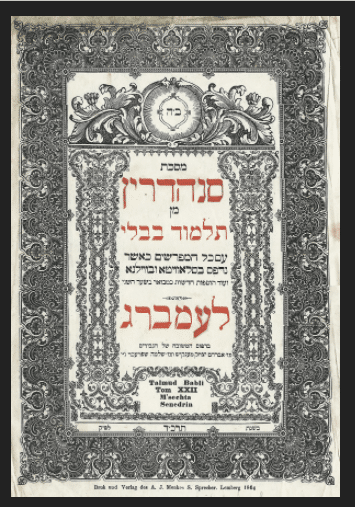The Talmud is a Jewish literary collection of teachings, laws, and interpretations based on the Old Testament Torah. It h as two parts, the Mishnah and that Gemara. The Mishnah, written in Hebrew, is the literary form of the Jewish oral tradition that many Jews considered to be equal to the Old Testament Scripture. The Gemara, written in Hebrew and Aramaic, is the analysis of the Mishnah. The topics covered are multitudinous, and the work itself is immense. Writing the Talmud took around 600 years, from the first century before Christ to about the fifth century after Christ. The main topics covered are history, laws, sabbaths, marriage, divorce, sacrifices, culture, and rules for interpreting the Torah. The Mishnah is arranged as follows:
as two parts, the Mishnah and that Gemara. The Mishnah, written in Hebrew, is the literary form of the Jewish oral tradition that many Jews considered to be equal to the Old Testament Scripture. The Gemara, written in Hebrew and Aramaic, is the analysis of the Mishnah. The topics covered are multitudinous, and the work itself is immense. Writing the Talmud took around 600 years, from the first century before Christ to about the fifth century after Christ. The main topics covered are history, laws, sabbaths, marriage, divorce, sacrifices, culture, and rules for interpreting the Torah. The Mishnah is arranged as follows:
- Zera’im (“Seeds”) – blessings, tithes, temple offerings, agriculture
- Mo’ed (“Set Feasts”) – Sabbath laws and holiday observances
- Nashim (“Women”) – marriage and divorce
- Nezikin (“Damages”) – idolatry, matters of civil law, and the Pirke Avot
- Kodashim (“Holy Things”) – sacrificial system in the Temple, dietary laws
- Tohorot (“Purities”) – ritual purity and impurity1
The Jews believed that the Torah, the first five books of the Bible (Genesis, Exodus, Leviticus, Numbers, Deuteronomy), which is also called the Pentateuch, were authored by Moses. However, along with the written Torah, the Jews also believe that Moses was also given oral tradition. This Oral Tradition was passed down to Joshua and then to the Prophets. It has thus been transmitted from person to person over the centuries.
There are two Talmuds: the Jerusalem Talmud and the Babylonian Talmud. The Jerusalem Talmud was compiled in Israel in the third century. The Babylonian Talmud was put together a couple of centuries later. The Babylonian Talmud covers more topics, is more prevalent, and normally when the word “Talmud” is used, the Babylonian Talmud is assumed to be the one referenced.
The Talmud has played a huge influence on Jewish thought and culture. Its discussions, which often lasted many many years, consist of a detailed analysis of biblical concepts aimed at answering various questions dealing with the law of Moses.
“The Talmud’s discussions are recorded in a consistent format. A law from the Mishnah is cited, followed by rabbinic deliberations on its meaning (i.e., the Gemara).”2
As Judaism expanded geographically and different schools of thought emerged, the Talmud became increasingly dominant in conservative Judaism but not in reformed Judaism.
Quotes from the Talmud
- “Food cooked entirely by Gentiles is forbidden; but if a third done by a Jew, it may be finished by a Gentile.” (The Babylonian Talmud, Complete Soncino English Translation, Kindle Location 18805).
- “On weekdays. Food cooked by Gentiles is forbidden. R. Nahman showed that this interdict does not apply to boiled water.” (The Babylonian Talmud, Complete Soncino English Translation, Kindle Location 22611).
- “The name of the Messiah, as it is written, His [sc. the Messiah’s] name shall endure for ever, and has exited before the sun!” (The Babylonian Talmud, Complete Soncino English Translation, Kindle Location 64584).
- “A sacrifice is slaughtered for the sake of six things: For the sake of the sacrifice, for the sake of the sacrificer, for the sake of the Divine Name, for the sake of fire-offerings, for the sake of a savour, for the sake of pleasing, and a sin-offering and a guilt-offering for the sake of sin.” (The Babylonian Talmud, Complete Soncino English Translation, Kindle Locations 304072-304074).
- “If a husband or wife, or parents, were crucified in the town, the wife, the husband, or the children shall not live in that town, except it be as large as Antioch, and even then they must remove to another part. Until what term are they not allowed to live there? Till the flesh is totally destroyed, and the bones cannot be recognized any longer.” (Rodkinson, Michael L., transl., The Babylonian Talmud, (ultimatebiblereferencelibrary.com) Volumes 1-10, 1918)






